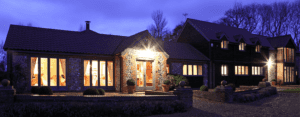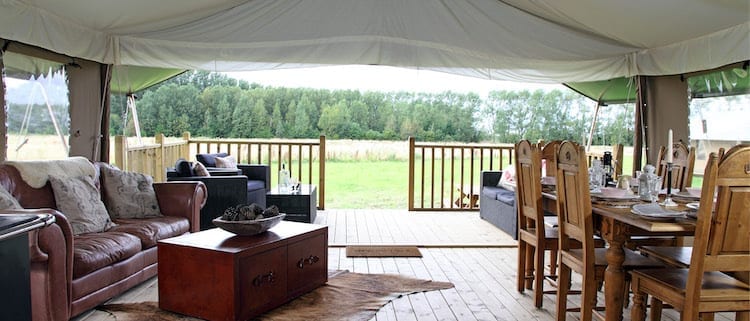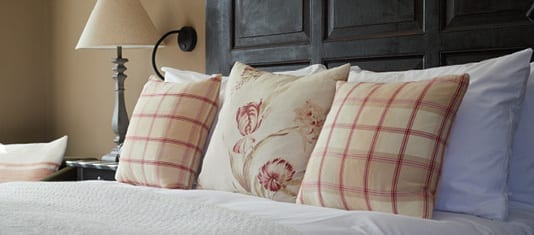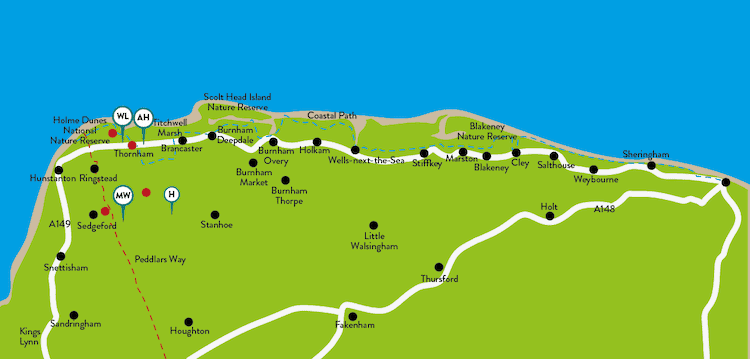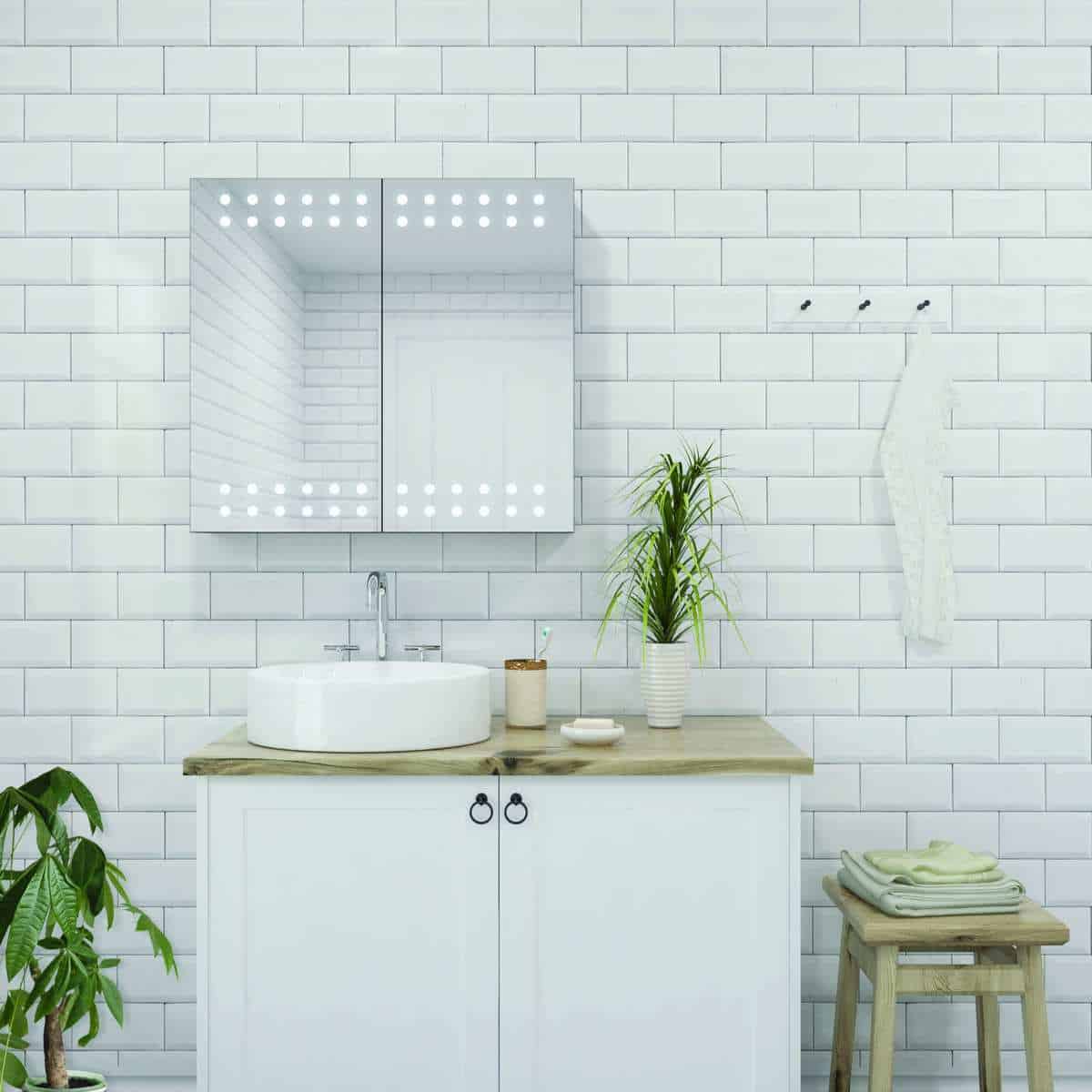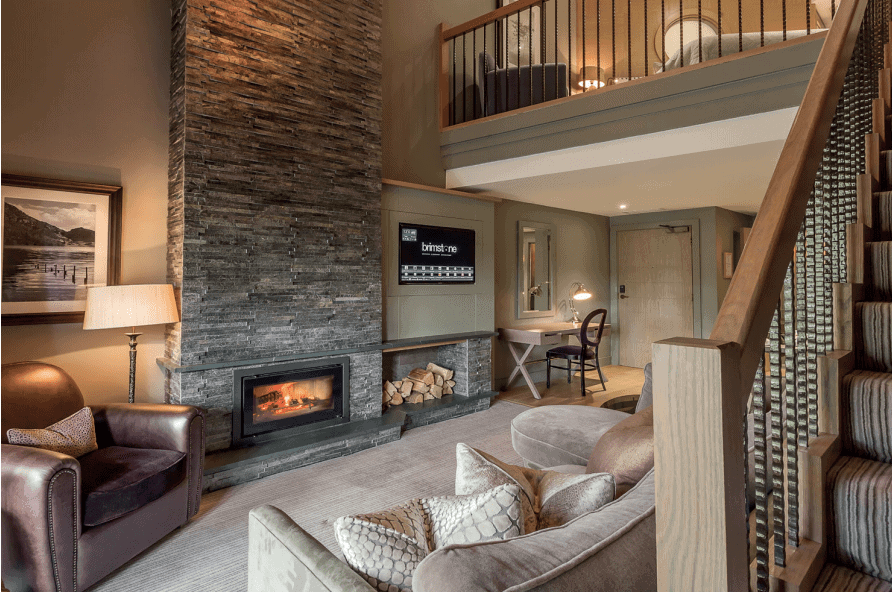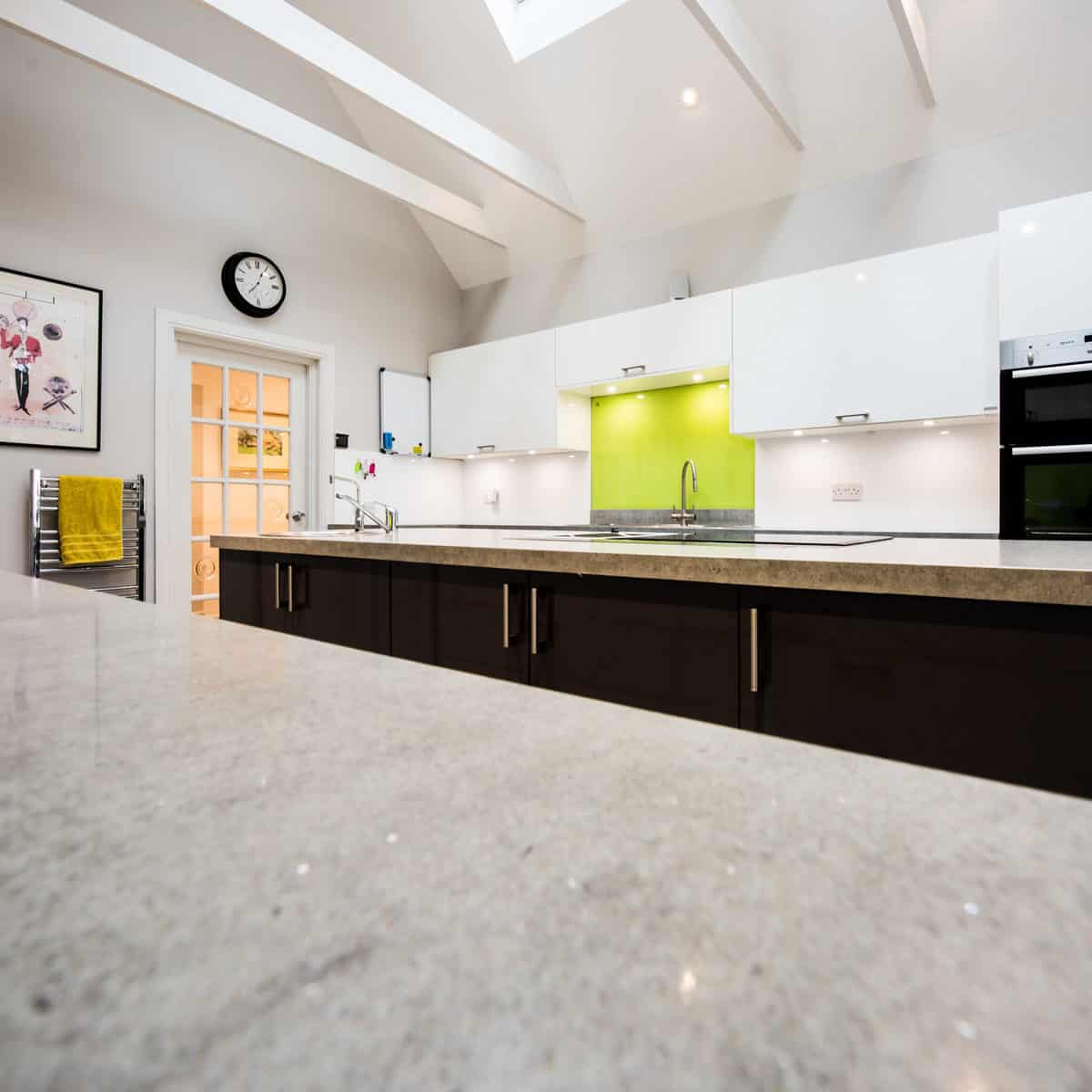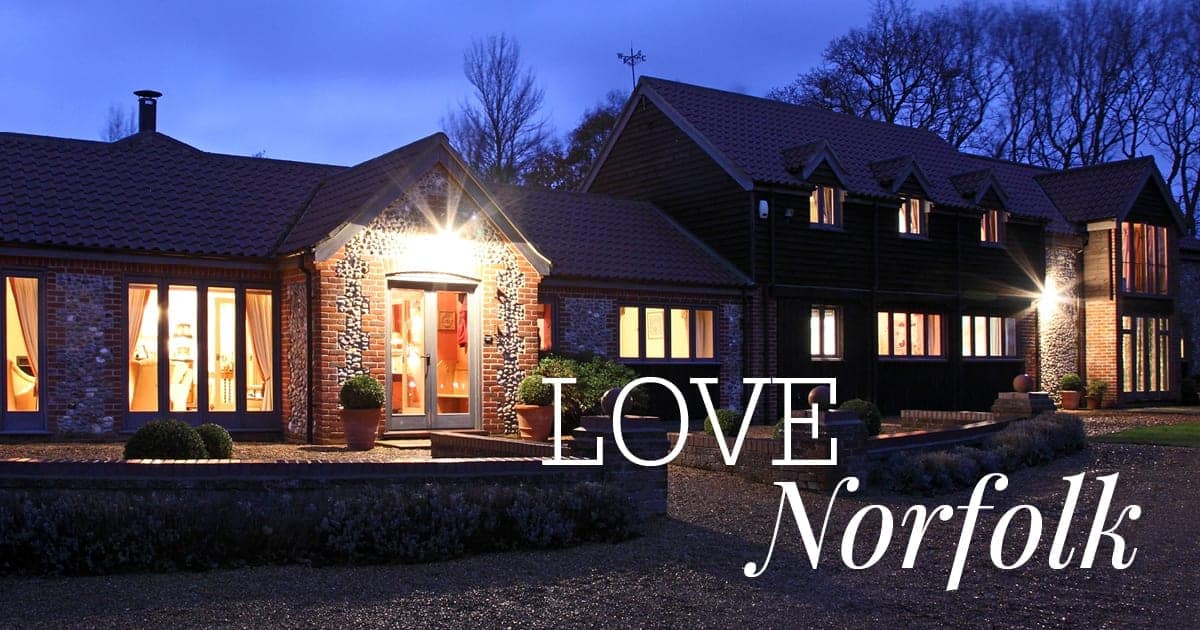
The development of Love Norfolk’s property portfolio took place over 11 years and now ranges from luxury B&Bs to glamping in safari lodges.
The owners of a portfolio of Norfolk properties explain how they make internet searches work for them.
THE PROPERTIES
The portfolio comprises four decidedly different places to stay
- Magazine Wood, a B&B with three luxury bedroom suites, which opened in 2008
- Wild Luxury, comprising two concept properties of safari lodges
- Hideaway, which opened in 2011
- Thornham Bay, which opened in 2013.
- Anna’s House, a luxury B&B with five guest rooms and dedicated parking with charging facilities, which opened in October 2019.
GLAMPING – WILD LUXURY
Wild Luxury – 18 Lodges + – 3 suites
Three years after the 2008 opening of Magazine House by Jonathan and Pip, in 2011 they opened Wild Luxury, consisting of a range of South Africa safari-themed lodges. These are sizeable units with a capacity of between six and 10 people. The first of these was The Hideaway with seven lodges.
Jonathan says: “The Hideaway is a slightly inland get-away-from-it-all place,” he says. “It’s a very pretty site in a 2,000-acre estate,” he says. “You can’t see light at night – it’s very much an escape from the world. Thornham Bay is right on the coast and from there you can walk to pubs and the beach. On site at Drove Orchards there is a farm shop and a permanent rural market with restaurants, artisan shops and food places.”
In the safari lodges the space is all divided up into individual rooms: three separate bedrooms, a living and a dining room and an outside terrace, with separate bathrooms which are outside but private to the lodge. “This means that actually living in one is much more like staying in a holiday cottage than staying altogether in one open space, which might sound like fun but it depends very much on how close up and personal you want to be!” he says.
MAGAZINE WOOD
Comprises three rooms all with separate suites and with their own terraces, with views over the Norfolk coast. The suites are individual units, each with its own private entrance and dedicated bathrooms and terraces. One of these is connected directly to the main house and the other two are separate, but all give the guests a sense of having their own little space, with private access meaning they you can come and go as they please. The guestrooms have iPads with their own online concierge, from where they can check out the local restaurants or order breakfast from the menu on the tablet. The anytime breakfast is in the room when guests arrive and comprises yoghurt, croissants and cereal, while hot options that can be ordered from the kitchen. This option ranges from avocado on sourdough through to a full English.
THE HIDEAWAY
The first of two wild luxury properties, sleeping between six and 10 guests, differs from the rest of the portfolio being entirely self-catering. This is the business’ glamping offer, with guests staying in South African canvas safari-style lodges on a raised deck. At the front are sun-bed loungers and the lodges themselves feature a dining area, a living area with leather sofas, a wood burner, fitted kitchen, an enclosed double bed, a separate master bedroom, and a twin room. At the rear is a power shower, a flushing lavatory. The pricier options include hairdryers and other such facilities.
THORNHAM BAY
Located on the coast itself, this features eleven safari lodges sleeping between two and six guests, with fitted kitchens and private bathrooms. When fully occupied it can hold 130 people. Walking distance of the beach, shops, pubs and restaurants, the lodges include a Pamper Pod with make-up stations, hair-dryers and pre-booked treatments, and sun-decks with an optional campfire/BBQ.
ANNA’S HOUSE
Anna’s House – One Suite and 4 Double rooms.
Last October the couple opened up this five-bedroom dedicated B&B. It comprises five individual luxury bedrooms which range from the cosy to the cavernous situated right on the Norfolk coast. Guests have their own terraces, copper baths and his-and-hers showers. It does not provide breakfasts, but is close to six restaurants and pubs.
MARKETING
Before moving into hospitality, Jonathan was a marketing director in corporate land. “When we started out it was relatively easy because of our first-mover advantage. These days you have to be a bit smarter with the world and his wife on the web now,” he says.
He uses his background in marketing to good effect. “I’m interested in marketing so that helps, but I have friends in hospitality who call saying they are getting no enquiries on their website after having spent a fortune on it.
“They fall into the trap of buying a website looking at it on day one thinking it is amazing and then it just sits there, for months and months. Then they say they paid and haven’t got traffic. It’s a bit like buying a car that sits in a drive and I don’t put fuel in it, and it doesn’t go anywhere,” he says.
LOVE NORFOLK
Decidedly Different places to stay on the Norfolk Coast.
GOOGLE’S NATURAL SEARCH
When Pip and Jonathan Barber set up the first of their range of B&B and glamping suites in 2008 it was in the early days of effective use of the Internet by the hospitality sector. “This was before the whole world had landed on the internet,” Jonathan says. “We ranked pretty highly for all the key phrases such as Norfolk coast bed & breakfast, Norfolk coast hotel, hotel by the sea etc.”
The same applied to searches such as wild luxury, glamping UK, glamping Norfolk, glamping East Anglia. “With all these we would pretty much be on the first page,” he says.
It was not long before this comfortable dynamic was first threatened and then lost with the arrival on the scene of OTAs. Soon the first page of a google search for accommodation was dominated by the likes of booking.com.
“Generally, you find now that the first page is very difficult to get onto,” says Jonathan. However, the key is that this applies to general searches more than to local searches, where he maintains it is still possible to find yourself on the first page of a search.
“We have put a lot of work into ensuring that on a local search we still rank pretty well. With regards to the actual general listings it’s very hard to get onto the first page,” he says.
ONLINE STRATEGY SHIFT
Three or four years ago, he says, their strategy changed. “We moved away from trying to perform well on those restricted terms which had been bought by the likes of booking.com,” he says.
“If people are more determined to look at page 2 then we still rank there pretty well. But we now focus on searches that we believe people would make if they were coming to Norfolk,” he explains. “We aimed to come highly on all those secondary phrases people will search for in an area – for example, beaches in Norfolk, Norfolk coast restaurants and so forth.”
For example, he says, a search on Norfolk plus anything to do with food, listed in the top three of the first page of results will be a guide to Norfolk restaurants that he and Pip put together, and which is hosted on Magazine Wood’s website.
People who find this site tend not only to be looking for a hotel, but also for something to do when they are there. “If they haven’t booked the hotel yet, then they will land on our website. It’s very common for people to say, “I stumbled across your website” – well you actually didn’t stumble across it – we put the website there for you to stumble across. They found it when they weren’t looking for it in their minds’ eye,” says Jonathan.
A COMPARISON BETWEEN NATURAL SEARCH & GOOGLE PAY-PER-CLICK (PPC)
NATURAL SEARCH:
+ Free when someone clicks on your link.
+ Can be considered more trusted since you’ve not just used marketing dollars to get you to the top of the list
+ You can gather a wider customer – maybe a customer who didn’t know they wanted to book but then they do.
NB – the downside to this is that they are less likely to be ready to buy and so you need to keep them enguaged and connected.
– Harder to control the advert / link text. Google will often decide on the text to display
– Natural search is often further down the page, even below the “fold”
PAY-PER-CLICK (PPC)
+ Immediate linking between the keywords and your site. So you can use PPC to try out keywords – e.g. an event name or local attraction.
+ Generally easier to get to the top of the list – albeit with money.
+ complete control of when your ad sits and how it looks. Place it on Maps, search results, booking….
+ often people clicking on PPC ads are in the market to buy right there and then.
– Can be expensive and easy to blast through your budget without. For example you might be advertising to a US audience
– can be tricky to setup however there is a good entry point with Googles help. See luxurybnbmag.co.uk/google
LOCAL EVENTS
The LoveNorfolk.co.uk website features a major event section that details every event happening within a 30-40-mile radius. Jonathan says: “We aim on every one of those events to rank highly to people looking to those events.
“That website only features our accommodation. People look at the events, and while on the site they see the accommodation including the glamping site as well as the B&B,” he says.
A further trick he follows is ensuring his website is the first to list the date of the next show such as the 2021 annual Norfolk Show.
“If you try to put that on your website, the chances of you appearing anywhere on it will be low because there’s so much info on the show itself. We aim to put up the date for any event before anybody else. If you look up the date for any event in Norfolk next year our web page will come up.” This clearly acts as a gateway to guests that would otherwise not have known about the property.
How does he manage to get the dates before anyone else? “We either get the dates, or we guess them and then change them if we find the guess is wrong by the time the dates are announced. But by this time, we are already ranking.
LOCAL ATTRACTION: SANDRINGHAM HOUSE
A particularly successful way of drawing their property to the attention of potential guests is by including a large amount of information on the Queen’s private retreat on its website. “A lot of people planning to visit this part of the country look up Sandringham house,” Jonathan says. “There is no booking.com for Sandringham House. So, it is easier for us to come to their attention.”
It is often said that the web search is a bit of a black art. While that may be true, he says, there are some good housekeeping things a hospitality business owner can do that will ensure your page will do better than someone else’s if they haven’t taken such measures.
“These are tips and tricks like making sure you label your photographs, making sure you build links into it and making sure you have a very tidy page that is easy to read,” he says.
But generally speaking, he concludes, Google is generally smarter than most of us. “When I go back eight or nine years when we came up on any search to do with Norfolk coast, that was great for us, but realistically it meant Google wasn’t actually doing a very good job. There were thousands of sites they could have gone to, but because their sites weren’t very well configured, we always came out on top.
“Now if you build a very broad website with lots of good information on it about lots of stuff that people who come to stay with you would like to know about, then by definition you will have good traffic,” he says.
TOOLS
Unsurprisingly the Barbers use quite a few tools to fine-tune their web performance. Jonathan says: “At the higher end we use SEMrush, for instance, which enables you to pick out 10 competitors and look at key performance indicators with your website and compare them to you, see exactly how you are doing in terms of traffic, key word scores and so forth.”
At the lower end, meanwhile, they use Google analytics. “This enables us to compare year on year traffic, but that is quite a blunt tool. Google analytics is of course geared to encouraging to take out paid key words, but realistically anyone who wants to do so will need very deep pockets.”
The good news is that just about the only budget you need to set aside in order to achieve this level of good practice is time and patience, he says, although he says: “We do spend money on actual website design, and a lot of the maps on our website are professionally designed. Anyone can tap in Map of Norfolk and then search on images and they will find a lot of our maps. There might be a map of the Norfolk coast, of Thornham, of birdwatching places – and they are all listed from our website but the all populate onto the web and drive in traffic.”
GETTING STARTED
I would recommend anyone who is new to the webworld to have a look at ‘3 Months to No.1:’
It is quite an easy read with a bit of humour and not techie and whilst it does have its roots in SEO it covers getting your website out there.
OTAS
Online travel agents have a huge part to play in the disruption to what ought to be an orderly process by which you market and sell your rooms. But it is only over the past decade or so that the potential of the Internet has been seized from the grasp of hospitality owners by the likes of booking.com.
The couple limit themselves to one OTA. “We use booking.com, which we try to use off-season, and we try to use them as a billboard effect. What we try to encourage guests to do – which is easier said than done – is to go onto booking.com, find us, and decide for themselves that it is better to book directly with us than with them.
“The Booking.com system is designed to encourage you to make your property more easily bookable on their site than yours. Every detail of every room, separate photos, room sizes etc. We did that ourselves with Magazine Wood to begin with, and it means if customers go onto booking.com they will get a similar or more concerning, a better booking experience via their third party site.
“Nowadays at Magazine Wood, if you go onto booking.com you can broadly see the type of rooms but there is more choice, information and images on our own site. It is easier to book specific rooms and the price is ever so slightly better. Therefore many people go onto booking.com and have a look at it before looking at our website and see an immediate advantage to booking direct. We also have banners urging them to ‘book local’. The idea is that they then book through us directly. If your website does not offer a better experience or price they will invariably book through the commissionable site they found you on. Contrary to popular belief, there is no requirement for you to offer the same price to booking.com as you do on your own website.”
We gently remind customers on check-out that they can find us online without having to pay commission charges. Most customers are quite concerned if they think they have also paid the commission charges!
Using the OTAs strategically like this is the best way to go. I encourage owners to think of them as a “lead generation” tool, whereby they’ll bring you the first booking, but the repeat bookings are down to you and your ability to build and maintain relationships with the guests you want to welcome back.
REPEAT BOOKINGS
Repeat bookings is the lifeblood of the business, he says. “We send out emails twice a year and we make sure that we will always get the email address from anyone who does ever come to us via an OTA, so all future correspondence is direct from us.”
He adds: “We don’t offer any particular loyalty rebook programs – I know some people do but we don’t. That may be something we will do in the future but as yet we haven’t needed to.”
“THERE ARE MANY ELEMENTS OF OUR WEBSITES WHICH ARE COMMON TO EACH OTHER AND BEGAN TO EFFECTIVELY COMPETE WITH EACH OTHER. WE HAVE NOW CREATED THOSE PAGES AS A COMMON RESOURCE TO ALL SITES AT LOVENORFOLK.CO.UK. THIS IS IN AREAS SUCH AS LOCAL GUIDES, EVENTS AND WHAT’S ON. THIS NOT ONLY SAVES TIME BUT BRINGS EVERYTHING TOGETHER UNDER ONE ROOF AND ALSO INCREASES OUR FOOTPRINT ON THE WEB. WE HOPE OVER TIME TO CREATE A SITE THAT WILL CREATE A LARGE NUMBER OF LEADS TO ALL BUSINESSES WE OPERATE.”
URLs
- lovenorfolk.co.uk
- wildluxury.co.uk
- annasnorfolk.co.uk
- magazinewood.co.uk
LOVE NORFOLK IN NUMBERS:
Total guests / bookings per year: 14,000 guests / 5,000 bookings
Year started: 2008
Annual Marketing budget: £7,000
Website management content and upgrades (across all sites): £4k
Advertising, online and elsewhere: £3k
Price range Off-peak lodge weekend £495 to Peak 7 day stay: £1395
Boutique Double Room: £115-£145


